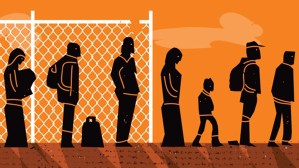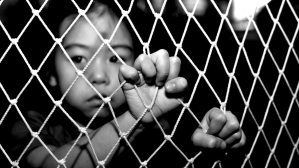In this series: Pursuing Justice and Compassion
It's amazing how quickly we shift from longing for justice to expecting mercy. If God's people are "to do justice and love mercy," as Micah puts it, neither of those things is hard to understand. But it's challenging to practice both of them at the same time.
It helps to understand what biblical justice is. As Paul Louis Metzger says, "As those justified by faith in the God of all justice, we are to experience the wholeness that he brings and extend it as citizens of his kingdom."
Bringing wholeness, making things right, is at the heart of God's justice. The articles in this Common Challenge show us how to do both justice and mercy, rightness and compassion. After all, God's goodness is seen in both his amazing justice and his amazing grace.

Everyone is for "justice," but as soon as anyone tries to make things more just, trouble follows. I came to this lab to hear from a panel of innovative activists who are working for justice.
Charles Lee is a pastor (New Hope in Torrance, CA) and an innovator. He's a guiding force beind the Freeze Project, where up to 2,000 people will gather in a public place and then freeze in place for 5 minutes, and then as people observe this form of performance art, the participants will then disperse after handing out a paper that highlights the problem of human trafficking.
He also developed LaundryLove.com–an initiative in which Christians offer free quarters and detergent in laundromats in under-resourced areas, along with a willingness to listen to the stories of those who stop by.
Leroy Barber pastors Community Fellowship Church in south Atlanta. He has initiated (1) Mission Year, a yearlong community service opportunity for 18-29-year-olds and (2) Green My Hood, an effort to improve the living conditions in urban neighborhoods.
Lisa Sharon Harper is cofounder and executive director of New York Faith and Justice. She offered a great definition of "justice": "making things right" and this includes withing the self, with God, with others, with systems. Systemic change is necessary, she said, to make things work so that "people are blessed and not cursed by the systems."
The panel told stories and probed the motivations of those who work for justice in housing, education, immigration, transportation, and other elements of community life. As Leroy Barber put it, "What are practical ways to love neighbor? Jesus to said to love others as yourself. In other words, do for others what you're doing/expecting for your own family. Whatever you expect regarding your own family's transportation, housing, education, assumptions, can you work to make those apply to others?"
Lisa took it a step further: "Jesus taught us to pray 'your kingdom come on earth as it is in heaven.' But so many people today can't imagine what the kingdom looks like at all—they think it's a worship service. Justice is a way of showing the world what heaven looks like."
This lab did a terrific job of elevating the vision of doing justice. It also left lingering questions about why justice efforts, especially those that seek to change "systems," inevitably lead to conflict.
I walked away convinced we need to do some more work on the relationship between justice and evangelism. How can the "announcement of good news" of God's kingdom be both proclaimed and lived out in our local communities.
We've got a long way to go on this . . .











